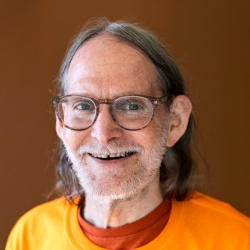The Blessed Lord said: Arjuna, before birth, beings are unmanifested.
Between birth and death, they manifest. And after death, they’re unmanifested again.
What is there to lament about?
In a previous blog post, we looked at Chapter 2 Verse 22, in which Sri Krishna spoke about death as an opportunity for the soul to receive a new body, a fresh vehicle to continue its journey Home. In this verse as well, Krishna indicates that we should perceive death as part of this sacred pilgrimage, rather than something looming over us that we dread. Rather than thinking of death as the opposite of life, Lord Krishna assures us that life is a continuous stream of births and deaths through which the soul gains the experience necessary to remember its true Identity. Just as we do not grieve over the setting of the sun, knowing that it will rise in the morning, so we need not grieve about leaving this body, knowing the soul is continuing its journey.
Earlier in Chapter 2, Krishna was speaking from the perspective of the indivisible and immortal Self that has no birth or death. At the opposite end of the spectrum is the point of view that we are born, then we die, and we exist no more. In this verse, Krishna is taking the middle path—when the Pure Consciousness identifies with the body/mind there seems to be an individual who has a birth and death. As this separate consciousness gains experience, learns lessons, and grows in understanding, it slowly but surely re-discovers itself as nothing other than the all pervading One.
Krishna asks, “What is there to lament about?” Most of us have some anxiety about death—whether it be from the fear of annihilation or the fear of the unknown. When I was about 17 years old I read a version of the Yoga Sutras of Patanjali by Swami Prabhavananda and Christopher Isherwood. They gave a different reason for the fear of death that left a lasting impression that has stayed with me all these years. They said that it is not because of the unknown but rather some part of our psyche remembers the experience, shortly after leaving the body, of having to review the life we just lived. We see before us all the ways we hurt others, our petty self-interest, the missed opportunities, and how the ego turned its back on the Light time and time again. These authors say that this process is so painful for most people that they cringe from having to go through it again.
Though yoga can help us to live comfortably in our body until a ripe old age, we know that, unlike us, the body was not designed to live forever. By meditating on this verse, we can be more prepared for the departure from this body and the return to what Krishna calls our “unmanifested” state. However, it is not the real unmanifested condition. It is relatively unmanifested because now we cannot be seen with the physical eye. But we still inhabit a subtle body. At the final stage of the spiritual path, we are truly Unmanifested, free from the confines of any limitation. This is how I would distinguish unmanifested with a small “u” from Unmanifested with a capital “U.” We manifest and unmanifest again and again until we become the glorious Unmanifested Divinity.
In the Bhagavad Gita, Krishna time and again reminds us that whatever our belief system, our philosophy, or religious orientation, it should help us to keep our minds steady in all circumstances, even in the face of death. Once we no longer lament death, then what can frighten us?
The Bhagavad Gita is a 2,500 year old Sanskrit text that offers profound insight into the deeper practices of yoga. As the seeker in the Gita metaphorically prepares for the battle of spiritual transformation, he asks his teacher a series of questions. In his answers the teacher explains the many challenges and stages of the yogic spiritual path.

